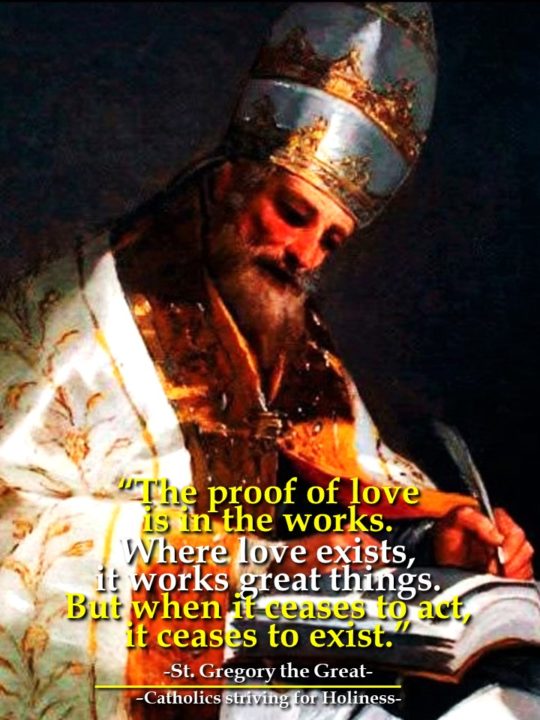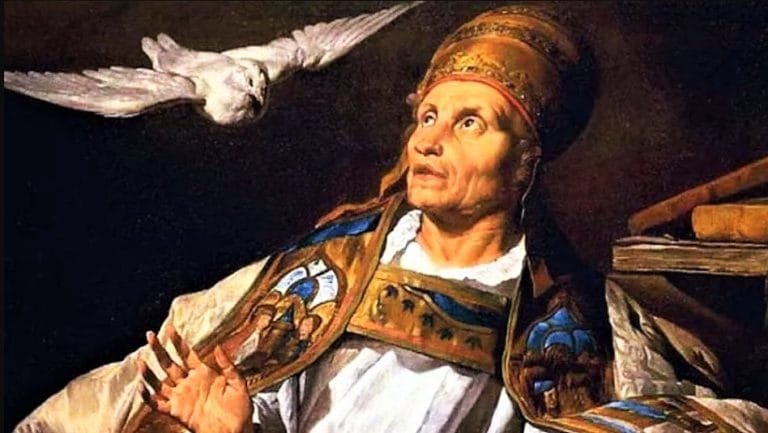Sept. 3: ST. GREGORY THE GREAT
Pope, Monk, Doctor of the Church
Inspiring biographical notes and achievements
Having a great respect to monastic life, upon his father’s death and inheriting all the properties, Gregory converted the family villa into a monastery dedicated to the Apostle, St. Andrew and then rededicated after his death, San Gregorio Magno al Monte Celio. In due time, 6 other monasteries were built in Sicily on his inherited properties.
He greatly influenced the life of the Church. Among his many achievements were:
- He unified the liturgy, modified the structure of the Mass, added the “Hanc igitur” in the Roman Canon or Eucharistic Prayer I.
- He also compiled the Gregorian chant named after him.
- Encouraged by his close friend, St. Leandro of Seville, whom he met in Constantinople, St. Gregory was a prolific writer and was credited to have initiated medieval spirituality. Among his famous works are: “Commentary on the Book of Job (Moralia on Job)”, “The Rule for Pastors”, “Dialogues”, and his “Sermons” on several Scriptural books (Ezekiel, the Gospels, 1Kings)
- Gregory is known for his administrative system of charitable relief of the poor at Rome, most of whom are refugees from the Lombard invasions. He received many donations from wealthy families which he distributed to the poor.
- He also encouraged the clerics to seek and help out the needy, giving them food, especially.
- He ordered the revenue-generating properties of the Church to ship food products to Rome and distributed them freely as alms to the poor. To those who were too sick to get their portion, he sent monks to deliver them every morning their food. It was said that he would not dine until the poor were fed.
- He is credited for revitalizing the evangelization of non-Christians in northern Europe. One of Gregory’s most far reaching actions was the Gregorian mission which consisted in sending 40 missionaries to England, among which is St. Augustine of Canterbury who belonged to the Monastery of St. Andrew. It was a successful mission. From England, missionaries set out to evangelize Netherlands and Germany.
In one of his speeches, Pope Benedict XVI comments:
[The] exceptional, I would say, almost unique figure [of Saint Gregory the Great, Pope and Doctor of the Church (ca. 540-604)] is an example to hold up both to pastors of the Church and to public administrators: indeed, he was first Prefect and then Bishop of Rome. As an imperial official, he was so distinguished for his administrative talents and moral integrity that he served in the highest civil office, Praefectus Urbis, when he was only thirty years old. Within him, however, the vocation to the monastic life was maturing; he embraced it in 574, upon his father’s death. The Benedictine Rule then became the backbone of his existence. Even when the Pope sent him as his Representative to the Emperor of the East in Constantinople, he maintained a simple and poor monastic life-style.
Called back to Rome, Gregory, although living in a monastery, was a close collaborator of Pope Pelagius II, and when the Pope died, the victim of a plague epidemic, Gregory was acclaimed by all as his Successor. He sought in every way to escape this appointment but in the end was obliged to yield. He left the cloister reluctantly and dedicated himself to the community, aware of doing his duty and being a simple and poor “servant of the servants of God”. “He is not really humble,” he wrote, “who understands that he must be a leader of others by decree of the divine will and yet disdains this pre-eminence. If, on the contrary, he submits to divine dispositions and does not have the vice of obstinacy and is prepared to benefit others with those gifts when the highest dignity of governing souls is imposed on him, he must flee from it with his heart, but against his will, he must obey” (Pastoral Rule, I, 6). It is like a dialogue that the Pope has with himself at that time. With prophetic foresight, Gregory intuited that a new civilization was being born from the encounter of the Roman legacy with so-called “barbarian” peoples, thanks to the cohesive power and moral elevation of Christianity. Monasticism was proving to be a treasure not only for the Church but for the whole of society.
With delicate health but strong moral character Saint Gregory the Great carried out intense pastoral and civil action. He left a vast collection of letters, wonderful homilies, a famous commentary on the Book of Job, and writings on the life of Saint Benedict, as well as numerous liturgical texts, famous for the reform of song that was called “Gregorian”, after him. However, his most famous work is certainly the Pastoral Rule, which had the same importance for the clergy as the Rule of Saint Benedict had for monks in the Middle Ages. The life of a pastor of souls must be a balanced synthesis of contemplation and action, inspired by the love “that rises wonderfully to high things when it is compassionately drawn to the low things of neighbors; and the more kindly it descends to the weak things of this world, the more vigorously it recurs to the things on high” (II, 5). In this ever timely teaching, the Fathers of the Second Vatican Council found inspiration to outline the image of today’s Pastor. Let us pray to the Virgin Mary that the example and teaching of Saint Gregory the Great may be followed by pastors of the Church and also by those in charge of civil institutions.
(3 September 2006)“
Dear friends, all these St. Gregory the Great did, despite of his poor health and the difficult political and social upheavals during his pontificate. Let us learn from his generous self-giving and service for God’s Church and all souls, especially those who are in need.
Stay updated: subscribe by email for free TO OUR NEW WEBSITE www.catholicsstrivingforholiness.org (PUT YOUR EMAIL IN THE SUBSCRIBE WIDGET).
We are also in www.fb.com/Catholicsstrivingforholiness. Kindly help more people in their Christian life by liking our page and inviting your family, friends and relatives to do so as well. Thanks in advance and God bless you and your loved ones! Fr. Rolly Arjonillo

